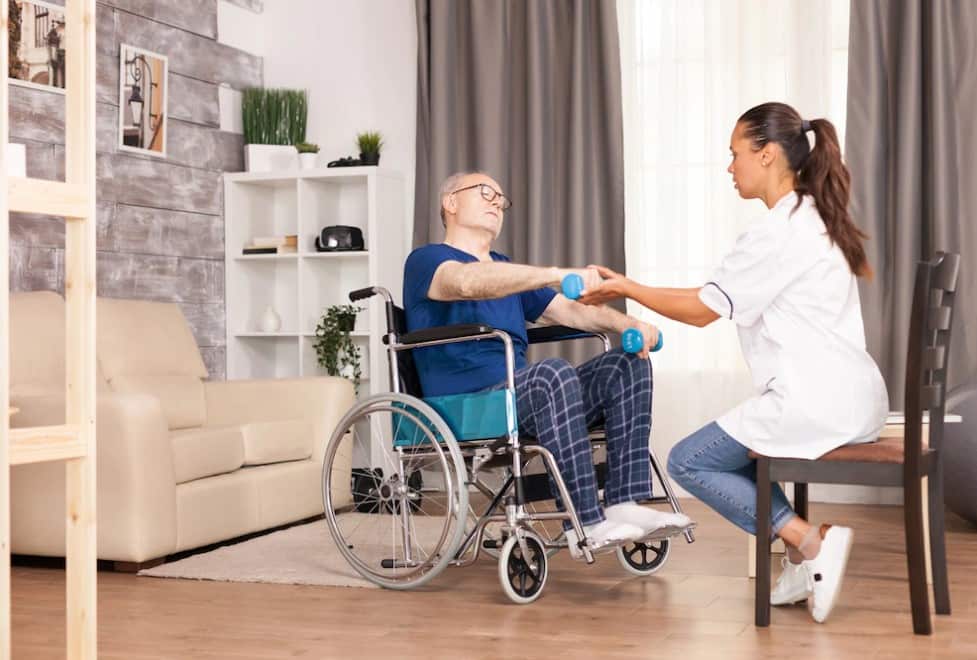When working with a home care provider makes a difference in quality of life
When working with a home care provider makes a difference in quality of life
Blog Article
Why Home Care Providers Are Essential for Comprehensive Disability Services and Assistance
Home care providers play a critical role in delivering thorough handicap services and support. They aid individuals with disabilities in day-to-day living tasks, fostering freedom and improving quality of life. By developing customized care strategies, these professionals resolve distinct needs, making sure effective treatments. Nevertheless, their impact prolongs beyond functional support. Comprehending the full extent of their contributions discloses deeper ramifications for area inclusivity and support. What exists below this essential service?
Understanding the Function of Home Treatment Providers
Lots of might assume that home care carriers primarily assist with fundamental day-to-day jobs, their role includes a wider range of assistance tailored to individuals with impairments. These experts play a vital part in enhancing the high quality of life for customers by supplying assistance that extends beyond mere housekeeping or personal health. Home treatment suppliers often facilitate social interaction, helping to fight feelings of isolation that can come with handicap. They might also assist with medication management, guaranteeing that individuals stick to their recommended treatments efficiently. Furthermore, home care companies often aid in coordinating appointments and transport, advertising access to vital medical care. By promoting independence and supplying emotional support, they equip individuals to engage even more completely in their communities. This holistic method not just addresses physical requirements but additionally supports psychological and emotional health, showing the complex nature of their substantial function in impairment services.
Tailored Treatment Plans for Person Demands
Tailored treatment strategies are vital for dealing with the unique demands of individuals with disabilities, making certain that each customer receives tailored support. Home treatment carriers work together with clients, family members, and healthcare specialists to establish these complete plans. By examining the particular obstacles and choices of each individual, carriers can determine required solutions and interventions that line up with their goals.These treatment plans take into consideration various aspects, including physical wellness, psychological well-being, and social communications. They might integrate aid with daily tasks, healing services, or specific tools. The involvement of caretakers that understand the subtleties of each customer's situation improves the effectiveness of these plans, cultivating a more helpful environment.

Enhancing Self-reliance and High Quality of Life
Enhancing independence and top quality of life for individuals with disabilities calls for a focus on advertising everyday autonomy. Customized care remedies can encourage customers to make options that best fit their special needs and choices. disability support. By promoting this freedom, home care suppliers play a vital role in boosting general wellness and complete satisfaction
Promoting Daily Autonomy
Equipping people with impairments to attain daily autonomy greatly improves their lifestyle. Home care providers play a crucial role in this process by encouraging self-sufficiency and cultivating freedom. By sustaining activities of everyday living, such as individual hygiene, dish prep work, and flexibility, caretakers help clients build confidence in their abilities. This motivation not only enhances practical abilities yet additionally advertises analytic and decision-making abilities. By valuing private preferences and choices, home treatment suppliers cultivate an environment where customers really feel valued and empowered. The outcome is a substantial increase in self-esteem and overall health, enabling individuals with handicaps to browse their daily lives with better simplicity and fulfillment. Ultimately, promoting everyday autonomy is crucial for promoting dignity and freedom.
Personalized Care Solutions
Individualized care solutions are necessary in meeting the one-of-a-kind requirements of individuals with specials needs, directly influencing their independence and top quality of life. These tailored approaches think about each person's preferences, capacities, and particular challenges, making sure that support is both appropriate and effective. Home treatment providers examine individual scenarios, developing customized strategies that address physical, emotional, and social demands. By fostering communication and cooperation, caregivers equip customers to actively take part in their very own treatment, promoting autonomy. This not only boosts their self-esteem however additionally encourages interaction in everyday tasks. Ultimately, customized treatment solutions add to an extra satisfying and enriched life for people with handicaps, enabling them to flourish within their communities and maintain self-respect in their day-to-day experiences.
Connecting the Space In Between Medical and Daily Treatment
Linking the void in between everyday and medical care is important for individuals with disabilities. A coordinated treatment strategy can boost individualized everyday support, guaranteeing that clients obtain both clinical support and everyday help customized to their requirements. This combination ultimately leads to a better high quality of life for those getting home care solutions.
Coordinated Care Approach
A worked with treatment method is essential for effectively incorporating medical services with day-to-day living support for people with handicaps. This technique fosters cooperation among medical care experts, families, and caretakers, making certain that all aspects of a person's treatment are synchronized. By assisting in communication in between clinical carriers and home care team, the coordinated technique minimizes spaces in solution delivery and improves the total high quality of treatment. This synergy enables prompt interventions, minimizing medical facility readmissions and boosting health results. In addition, it empowers people with handicaps by providing an alternative assistance system that addresses both medical requirements and day-to-day living challenges. Eventually, a collaborated treatment strategy is vital for advertising freedom and boosting the lifestyle for those with impairments.
Personalized Daily Help
Reliable daily assistance plays a vital duty in attaching treatment with the everyday needs of individuals with specials needs. Home treatment carriers customize their services to meet the distinct requirements of each individual, guaranteeing that individual care, meal preparation, and house jobs are handled effectively (disability support). This customized method not only promotes adherence to suggested medical programs yet also equips people to preserve a degree of self-reliance. Caregivers are educated to recognize and attend to specific difficulties that customers encounter, bridging the space between clinical visits and everyday living. By incorporating clinical expertise with functional assistance, these providers enhance the general efficiency of care, guaranteeing that individuals obtain holistic support that includes both their wellness and everyday living demands
Enhanced Top Quality of Life
While treatment is crucial for people with disabilities, it is the assimilation of everyday living assistance that genuinely enhances their top quality of life. Home treatment companies link the gap between clinical attention and everyday requirements, offering customized assistance that advertises independence. By attending to individual care, house tasks, and social interaction, these service providers develop an environment helpful to well-being. This alternative strategy not only aids in physical wellness but likewise cultivates emotional stability and social links. When people receive individualized assistance, they experience increased confidence and enhanced psychological health, causing better life complete satisfaction. Eventually, home treatment solutions empower individuals with handicaps to lead fulfilling lives, making them an important element of detailed impairment solutions and assistance.
The Relevance of Educated Professionals

Structure Solid Relationships With Customers and Family Members
Establishing strong partnerships with customers and their family members is essential for boosting the general quality of home care solutions. Home treatment providers that focus on interaction and trust fund cultivate an atmosphere where customers feel risk-free and valued. This link enables caretakers to better comprehend individual needs and choices, bring about more tailored treatment strategies.Moreover, entailing relative in the care process helps ensure that everyone is aligned on objectives and expectations. Regular updates and open discussions develop a feeling of collaboration, which can alleviate issues and develop self-confidence in the care being provided.Confident clients and families are more probable to engage proactively in the treatment strategy, leading to boosted wellness outcomes. In addition, strong partnerships urge feedback, making it possible for suppliers to constantly adapt and improve their services. Ultimately, these bonds lay the foundation for an encouraging, considerate, and reliable home care experience.
Promoting for Rights and Access in the Area
Supporting for the legal rights and accessibility of individuals with impairments within the area is necessary for promoting a comprehensive atmosphere. image source Home treatment companies play an essential function in this advocacy by elevating awareness of the barriers faced by people with handicaps. They work together with regional companies, federal government companies, and stakeholders to promote policy adjustments that boost accessibility to services and public spaces.These companies likewise encourage clients by educating them of their civil liberties and offered resources, motivating self-advocacy. This assistance not just boosts individual lives however additionally grows a society of inclusivity in the community. By proactively taking part in advocacy efforts, home treatment suppliers aid take down preconception and discrimination, guaranteeing that individuals with specials needs can participate totally in society.Ultimately, the check my reference dedication of home care providers to support for rights and accessibility adds significantly to the development of a more equitable and encouraging area for all.
Regularly Asked Inquiries
What Qualifications Should I Search for in a Home Care Provider?
When examining a home treatment service provider, one must think about credentials such as appropriate certifications, experience in specific care demands, strong communication abilities, background checks, and favorable recommendations to guarantee quality and safety and security in caregiving.
Just How Do Home Care Solutions Differ From Standard Nursing Treatment?
Home treatment services concentrate on individualized support within clients' homes, promoting independence, while standard nursing treatment normally involves medical treatments in professional settings. This difference highlights customized support versus institutionalized medical treatment for numerous demands.
What Is the Regular Expense of Home Care Providers?

Just How Can I Discover a Reliable Home Care Firm?
Locating a trusted home treatment agency involves looking into local alternatives, checking out reviews, inspecting credentials, and seeking recommendations from healthcare professionals or pals. It's important to talk to prospective companies to ensure they meet specific care needs.
What Insurances Normally Cover Home Treatment Solutions?
Insurance policy coverage for home care services commonly consists of Medicare, Medicaid, and private medical insurance strategies. Each plan differs, so people must consult their insurance policy provider to understand particular advantages and insurance coverage details connected to home care solutions. Additionally, home care carriers frequently assist in working with appointments and transportation, promoting accessibility to important clinical treatment. By facilitating interaction between clinical service providers and home treatment team, the collaborated approach lessens gaps in solution shipment and boosts the general quality of care. Home treatment service providers tailor their services to meet the distinct needs of each individual, making sure that individual care, click for source meal prep work, and household jobs are managed efficiently. Home treatment solutions concentrate on individualized assistance within clients' homes, fostering independence, while traditional nursing treatment commonly involves clinical treatments in professional settings. The typical expense of home care solutions differs commonly, depending on variables such as place, degree of treatment called for, and duration of solution.
Report this page